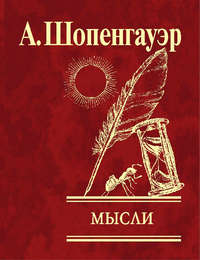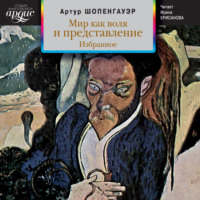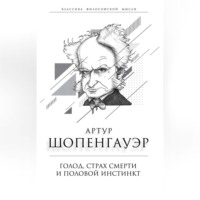 полная версия
полная версияThe World as Will and Idea (Vol. 2 of 3)
Through all that I have said hitherto I hope I have placed in a clear light the important truth that since all abstract knowledge springs from knowledge of perception, it obtains its whole value from its relation to the latter, thus from the fact that its conceptions, or the abstractions which they denote, can be realised, i. e., proved, through perceptions; and, moreover, that most depends upon the quality of these perceptions. Conceptions and abstractions which do not ultimately refer to perceptions are like paths in the wood that end without leading out of it. The great value of conceptions lies in the fact that by means of them the original material of knowledge is more easily handled, surveyed, and arranged. But although many kinds of logical and dialectical operations are possible with them, yet no entirely original and new knowledge will result from these; that is to say, no knowledge whose material neither lay already in perception nor was drawn from self-consciousness. This is the true meaning of the doctrine attributed to Aristotle: Nihil est in intellectu, nisi quod antea fuerit in sensu. It is also the meaning of the Lockeian philosophy, which made for ever an epoch in philosophy, because it commenced at last the serious discussion of the question as to the origin of our knowledge. It is also principally what the “Critique of Pure Reason” teaches. It also desires that we should not remain at the conceptions, but go back to their source, thus to perception; only with the true and important addition that what holds good of the perception also extends to its subjective conditions, thus to the forms which lie predisposed in the perceiving and thinking brain as its natural functions; although these at least virtualiter precede the actual sense-perception, i. e., are a priori, and therefore do not depend upon sense-perception, but it upon them. For these forms themselves have indeed no other end, nor service, than to produce the empirical perception on the nerves of sense being excited, as other forms are determined afterwards to construct thoughts in the abstract from the material of perception. The “Critique of Pure Reason” is therefore related to the Lockeian philosophy as the analysis of the infinite to elementary geometry, but is yet throughout to be regarded as the continuation of the Lockeian philosophy. The given material of every philosophy is accordingly nothing else than the empirical consciousness, which divides itself into the consciousness of one's own self (self-consciousness) and the consciousness of other things (external perception). For this alone is what is immediately and actually given. Every philosophy which, instead of starting from this, takes for its starting-point arbitrarily chosen abstract conceptions, such as, for example, absolute, absolute substance, God, infinity, finitude, absolute identity, being, essence, &c., &c., moves in the air without support, and can therefore never lead to a real result. Yet in all ages philosophers have attempted it with such materials; and hence even Kant sometimes, according to the common usage, and more from custom than consistency, defines philosophy as a science of mere conceptions. But such a science would really undertake to extract from the partial ideas (for that is what the abstractions are) what is not to be found in the complete ideas (the perceptions), from which the former were drawn by abstraction. The possibility of the syllogism leads to this mistake, because here the combination of the judgments gives a new result, although more apparent than real, for the syllogism only brings out what already lay in the given judgments; for it is true the conclusion cannot contain more than the premisses. Conceptions are certainly the material of philosophy, but only as marble is the material of the sculptor. It is not to work out of them but in them; that is to say, it is to deposit its results in them, but not to start from them as what is given. Whoever wishes to see a glaring example of such a false procedure from mere conceptions may look at the “Institutio Theologica” of Proclus in order to convince himself of the vanity of that whole method. There abstractions such as “ἑν, πληθος, αγαθον, παραγον και παραγομενον, αυταρκες, αιτιον, κρειττον, κινητον, ακινητον, κινουμενον” (unum, multa, bonum, producens et productum, sibi sufficiens, causa, melius, mobile, immobile, motum), &c., are indiscriminately collected, but the perceptions to which alone they owe their origin and content ignored and contemptuously disregarded. A theology is then constructed from these conceptions, but its goal, the θεος, is kept concealed; thus the whole procedure is apparently unprejudiced, as if the reader did not know at the first page, just as well as the author, what it is all to end in. I have already quoted a fragment of this above. This production of Proclus is really quite peculiarly adapted to make clear how utterly useless and illusory such combinations of abstract conceptions are, for we can make of them whatever we will, especially if we further take advantage of the ambiguity of many words, such, for example, as κρειττον. If such an architect of conceptions were present in person we would only have to ask naively where all the things are of which he has so much to tell us, and whence he knows the laws from which he draws his conclusions concerning them. He would then soon be obliged to turn to empirical perception, in which alone the real world exhibits itself, from which those conceptions are drawn. Then we would only have to ask further why he did not honestly start from the given perception of such a world, so that at every step his assertions could be proved by it, instead of operating with conceptions, which are yet drawn from perception alone, and therefore can have no further validity than that which it imparts to them. But of course this is just his trick. Through such conceptions, in which, by virtue of abstraction, what is inseparable is thought as separate, and what cannot be united as united, he goes far beyond the perception which was their source, and thus beyond the limits of their applicability, to an entirely different world from that which supplied the material for building, but just on this account to a world of chimeras. I have here referred to Proclus because in him this procedure becomes specially clear through the frank audacity with which he carries it out. But in Plato also we find some examples of this kind, though not so glaring; and in general the philosophical literature of all ages affords a multitude of instances of the same thing. That of our own time is rich in them. Consider, for example, the writings of the school of Schelling, and observe the constructions that are built up out of abstractions like finite and infinite – being, non-being, other being – activity, hindrance, product – determining, being determined, determinateness – limit, limiting, being limited – unity, plurality, multiplicity – identity, diversity, indifference – thinking, being, essence, &c. Not only does all that has been said above hold good of constructions out of such materials, but because an infinite amount can be thought through such wide abstractions, only very little indeed can be thought in them; they are empty husks. But thus the matter of the whole philosophising becomes astonishingly trifling and paltry, and hence arises that unutterable and excruciating tediousness which is characteristic of all such writings. If indeed I now chose to call to mind the way in which Hegel and his companions have abused such wide and empty abstractions, I should have to fear that both the reader and I myself would be ill; for the most nauseous tediousness hangs over the empty word-juggling of this loathsome philophaster.
That in practical philosophy also no wisdom is brought to light from mere abstract conceptions is the one thing to be learnt from the ethical dissertations of the theologian Schleiermacher, with the delivery of which he has wearied the Berlin Academy for a number of years, and which are shortly to appear in a collected form. In them only abstract conceptions, such as duty, virtue, highest good, moral law, &c., are taken as the starting-point, without further introduction than that they commonly occur in ethical systems, and are now treated as given realities. He then discusses these from all sides with great subtilty, but, on the other hand, never makes for the source of these conceptions, for the thing itself, the actual human life, to which alone they are related, from which they ought to be drawn, and with which morality has, properly speaking, to do. On this account these diatribes are just as unfruitful and useless as they are tedious, which is saying a great deal. At all times we find persons, like this theologian, who is too fond of philosophising, famous while they are alive, afterwards soon forgotten. My advice is rather to read those whose fate has been the opposite of this, for time is short and valuable.
Now although, in accordance with all that has been said, wide, abstract conceptions, which can be realised in no perception, must never be the source of knowledge, the starting-point or the proper material of philosophy, yet sometimes particular results of philosophy are such as can only be thought in the abstract, and cannot be proved by any perception. Knowledge of this kind will certainly only be half knowledge; it will, as it were, only point out the place where what is to be known lies; but this remains concealed. Therefore we should only be satisfied with such conceptions in the most extreme case, and when we have reached the limit of the knowledge possible to our faculties. An example of this might perhaps be the conception of a being out of time; such as the proposition: the indestructibility of our true being by death is not a continued existence of it. With conceptions of this sort the firm ground which supports our whole knowledge, the perceptible, seems to waver. Therefore philosophy may certainly at times, and in case of necessity, extend to such knowledge, but it must never begin with it.
The working with wide abstractions, which is condemned above, to the entire neglect of the perceptive knowledge from which they are drawn, and which is therefore their permanent and natural controller, was at all times the principal source of the errors of dogmatic philosophy. A science constructed from the mere comparison of conceptions, that is, from general principles, could only be certain if all its principles were synthetical a priori, as is the case in mathematics: for only such admit of no exceptions. If, on the other hand, the principles have any empirical content, we must keep this constantly at hand, to control the general principles. For no truths which are in any way drawn from experience are ever unconditionally true. They have therefore only an approximately universal validity; for here there is no rule without an exception. If now I link these principles together by means of the intersection of their concept-spheres, one conception might very easily touch the other precisely where the exception lies. But if this happens even only once in the course of a long train of reasoning, the whole structure is loosed from its foundation and moves in the air. If, for example, I say, “The ruminants have no front incisors,” and apply this and what follows from it to the camel, it all becomes false, for it only holds good of horned ruminants. What Kant calls das Vernünfteln, mere abstract reasoning, and so often condemns, is just of this sort. For it consists simply in subsuming conceptions under conceptions, without reference to their origin, and without proof of the correctness and exclusiveness of such subsumption – a method whereby we can arrive by longer or shorter circuits at almost any result we choose to set before us as our goal. Hence this mere abstract reasoning differs only in degree from sophistication strictly so called. But sophistication is in the theoretical sphere exactly what chicanery is in the practical. Yet even Plato himself has very frequently permitted such mere abstract reasoning; and Proclus, as we have already mentioned, has, after the manner of all imitators, carried this fault of his model much further. Dionysius the Areopagite, “De Divinis Nominibus,” is also strongly affected with this. But even in the fragments of the Eleatic Melissus we already find distinct examples of such mere abstract reasoning (especially § 2-5 in Brandis' Comment. Eleat.) His procedure with the conceptions, which never touch the reality from which they have their content, but, moving in the atmosphere of abstract universality, pass away beyond it, resembles blows which never hit the mark. A good pattern of such mere abstract reasoning is the “De Diis et Mundo” of the philosopher Sallustius Büchelchen; especially chaps. 7, 12, and 17. But a perfect gem of philosophical mere abstract reasoning passing into decided sophistication is the following reasoning of the Platonist, Maximus of Tyre, which I shall quote, as it is short: “Every injustice is the taking away of a good. There is no other good than virtue: but virtue cannot be taken away: thus it is not possible that the virtuous can suffer injustice from the wicked. It now remains either that no injustice can be suffered, or that it is suffered by the wicked from the wicked. But the wicked man possesses no good at all, for only virtue is a good; therefore none can be taken from him. Thus he also can suffer no injustice. Thus injustice is an impossible thing.” The original, which is less concise through repetitions, runs thus: “Αδικια εστι αφαιρεσις αγαθου; το δε αγαθον τι αν ειη αλλο η αρετη? – ἡ δε αρετη αναφαιρετον. Ουκ αδικησεται τοινυν ὁ την αρετην εχων, η ουκ εστιν αδικια αφαιρεσις αγαθου; ουδεν γαρ αγαθον αφαιρετον, ουδ᾽ χαποβλητον, ουδ ἑλετον, ουδε ληιστον. Ειεν ουν, ουδ᾽ αδικειται ὁ χρηστος, ουδ ὑπο του μοχθηρου; αναφαιρετος γαρ. Λειπεται τοινυν η μηδενα αδικεισθαι καθαπαξ, η τον μοχθηρον ὑπο του ὁμοιου; αλλα τῳ μοχθηρῳ ουδενος μετεστιν αγαθου; ἡ δε αδικια ην αγαθου αφαιρεσις; ὁ δε μη εχων ὁ, τι αφαιρεσθη, ουδε εις ὁ, τι αδικησθη, εχει” (Sermo 2). I shall add further a modern example of such proofs from abstract conceptions, by means of which an obviously absurd proposition is set up as the truth, and I shall take it from the works of a great man, Giordano Bruno. In his book, “Del Infinito Universo e Mondi” (p. 87 of the edition of A. Wagner), he makes an Aristotelian prove (with the assistance and exaggeration of the passage of Aristotle's De Cœlo, i. 5) that there can be no space beyond the world. The world is enclosed by the eight spheres of Aristotle, and beyond these there can be no space. For if beyond these there were still a body, it must either be simple or compound. It is now proved sophistically, from principles which are obviously begged, that no simple body could be there; and therefore, also, no compound body, for it would necessarily be composed of simple ones. Thus in general there can be no body there – but if not, then no space. For space is defined as “that in which bodies can be;” and it has just been proved that no body can be there. Thus there is also there no space. This last is the final stroke of this proof from abstract conceptions. It ultimately rests on the fact that the proposition, “Where no space is, there can be no body” is taken as a universal negative, and therefore converted simply, “Where no body can be there is no space.” But the former proposition, when properly regarded, is a universal affirmative: “Everything that has no space has no body,” thus it must not be converted simply. Yet it is not every proof from abstract conceptions, with a conclusion which clearly contradicts perception (as here the finiteness of space), that can thus be referred to a logical error. For the sophistry does not always lie in the form, but often in the matter, in the premisses, and in the indefiniteness of the conceptions and their extension. We find numerous examples of this in Spinoza, whose method indeed it is to prove from conceptions. See, for example, the miserable sophisms in his “Ethics,” P. iv., prop. 29-31, by means of the ambiguity of the uncertain conceptions convenire and commune habere. Yet this does not prevent the neo-Spinozists of our own day from taking all that he has said for gospel. Of these the Hegelians, of whom there are actually still a few, are specially amusing on account of their traditional reverence for his principle, omnis determinatio est negatio, at which, according to the charlatan spirit of the school, they put on a face as if it was able to unhinge the world; whereas it is of no use at all, for even the simplest can see for himself that if I limit anything by determinations, I thereby exclude and thus negate what lies beyond these limits.
Thus in all mere reasonings of the above kind it becomes very apparent what errors that algebra with mere conceptions, uncontrolled by perception, is exposed to, and that therefore perception is for our intellect what the firm ground upon which it stands is for our body: if we forsake perception everything is instabilis tellus, innabilis unda. The reader will pardon the fulness of these expositions and examples on account of their instructiveness. I have sought by means of them to bring forward and support the difference, indeed the opposition, between perceptive and abstract or reflected knowledge, which has hitherto been too little regarded, and the establishment of which is a fundamental characteristic of my philosophy. For many phenomena of our mental life are only explicable through this distinction. The connecting link between these two such different kinds of knowledge is the faculty of judgment, as I have shown in § 14 of the first volume. This faculty is certainly also active in the province of mere abstract knowledge, in which it compares conceptions only with conceptions; therefore every judgment, in the logical sense of the word, is certainly a work of the faculty of judgment, for it always consists in the subsumption of a narrower conception under a wider one. Yet this activity of the faculty of judgment, in which it merely compares conceptions with each other, is a simpler and easier task than when it makes the transition from what is quite particular, the perception, to the essentially general, the conception. For by the analysis of conceptions into their essential predicates it must be possible to decide upon purely logical grounds whether they are capable of being united or not, and for this the mere reason which every one possesses is sufficient. The faculty of judgment is therefore only active here in shortening this process, for he who is gifted with it sees at a glance what others only arrive at through a series of reflections. But its activity in the narrower sense really only appears when what is known through perception, thus the real experience, has to be carried over into distinct abstract knowledge, subsumed under accurately corresponding conceptions, and thus translated into reflected rational knowledge. It is therefore this faculty which has to establish the firm basis of all sciences, which always consists of what is known directly and cannot be further denied. Therefore here, in the fundamental judgments, lies the difficulty of the sciences, not in the inferences from these. To infer is easy, to judge is difficult. False inferences are rare, false judgments are always the order of the day. Not less in practical life has the faculty of judgment to give the decision in all fundamental conclusions and important determinations. Its office is in the main like that of the judicial sentence. As the burning-glass brings to a focus all the sun's rays, so when the understanding works, the intellect has to bring together all the data which it has upon the subject so closely that the understanding comprehends them at a glance, which it now rightly fixes, and then carefully makes the result distinct to itself. Further, the great difficulty of judging in most cases depends upon the fact that we have to proceed from the consequent to the reason, a path which is always uncertain; indeed I have shown that the source of all error lies here. Yet in all the empirical sciences, and also in the affairs of real life, this way is for the most part the only one open to us. The experiment is an attempt to go over it again the other way; therefore it is decisive, and at least brings out error clearly; provided always that it is rightly chosen and honestly carried out; not like Newton's experiments in connection with the theory of colours. But the experiment itself must also again be judged. The complete certainty of the a priori sciences, logic and mathematics, depends principally upon the fact that in them the path from the reason to the consequent is open to us, and it is always certain. This gives them the character of purely objective sciences, i. e., sciences with regard to whose truths all who understand them must judge alike; and this is all the more remarkable as they are the very sciences which rest on the subjective forms of the intellect, while the empirical sciences alone have to do with what is palpably objective.
Wit and ingenuity are also manifestations of the faculty of judgment; in the former its activity is reflective, in the latter subsuming. In most men the faculty of judgment is only nominally present; it is a kind of irony that it is reckoned with the normal faculties of the mind, instead of being only attributed to the monstris per excessum. Ordinary men show even in the smallest affairs want of confidence in their own judgment, just because they know from experience that it is of no service. With them prejudice and imitation take its place; and thus they are kept in a state of continual non-age, from which scarcely one in many hundreds is delivered. Certainly this is not avowed, for even to themselves they appear to judge; but all the time they are glancing stealthily at the opinion of others, which is their secret standard. While each one would be ashamed to go about in a borrowed coat, hat, or mantle, they all have nothing but borrowed opinions, which they eagerly collect wherever they can find them, and then strut about giving them out as their own. Others borrow them again from them and do the same thing. This explains the rapid and wide spread of errors, and also the fame of what is bad; for the professional purveyors of opinion, such as journalists and the like, give as a rule only false wares, as those who hire out masquerading dresses give only false jewels.
Chapter VIII.20 On The Theory Of The Ludicrous
My theory of the ludicrous also depends upon the opposition explained in the preceding chapters between perceptible and abstract ideas, which I have brought into such marked prominence. Therefore what has still to be said in explanation of this theory finds its proper place here, although according to the order of the text it would have to come later.
The problem of the origin, which is everywhere the same, and hence of the peculiar significance of laughter, was already known to Cicero, but only to be at once dismissed as insoluble (De Orat., ii. 58). The oldest attempt known to me at a psychological explanation of laughter is to be found in Hutcheson's “Introduction into Moral Philosophy,” Bk. I., ch. i. § 14. A somewhat later anonymous work, “Traité des Causes Physiques et Morals du Rire,” 1768, is not without merit as a ventilation of the subject. Platner, in his “Anthropology,” § 894, has collected the opinions of the philosophers from Hume to Kant who have attempted an explanation of this phenomenon peculiar to human nature. Kant's and Jean Paul's theories of the ludicrous are well known. I regard it as unnecessary to prove their incorrectness, for whoever tries to refer given cases of the ludicrous to them will in the great majority of instances be at once convinced of their insufficiency.
According to my explanation given in the first volume, the source of the ludicrous is always the paradoxical, and therefore unexpected, subsumption of an object under a conception which in other respects is different from it, and accordingly the phenomenon of laughter always signifies the sudden apprehension of an incongruity between such a conception and the real object thought under it, thus between the abstract and the concrete object of perception. The greater and more unexpected, in the apprehension of the laughter, this incongruity is, the more violent will be his laughter. Therefore in everything that excites laughter it must always be possible to show a conception and a particular, that is, a thing or event, which certainly can be subsumed under that conception, and therefore thought through it, yet in another and more predominating aspect does not belong to it at all, but is strikingly different from everything else that is thought through that conception. If, as often occurs, especially in witticisms, instead of such a real object of perception, the conception of a subordinate species is brought under the higher conception of the genus, it will yet excite laughter only through the fact that the imagination realises it, i. e., makes a perceptible representative stand for it, and thus the conflict between what is thought and what is perceived takes place. Indeed if we wish to understand this perfectly explicitly, it is possible to trace everything ludicrous to a syllogism in the first figure, with an undisputed major and an unexpected minor, which to a certain extent is only sophistically valid, in consequence of which connection the conclusion partakes of the quality of the ludicrous.









